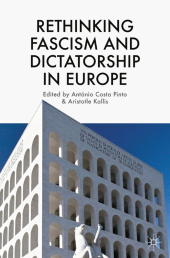 Neuerscheinungen 2014Stand: 2020-02-01 |
Schnellsuche
ISBN/Stichwort/Autor
|
Herderstraße 10
10625 Berlin
Tel.: 030 315 714 16
Fax 030 315 714 14
info@buchspektrum.de |

António Costa Pinto, A. Kallis
(Beteiligte)
Rethinking Fascism and Dictatorship in Europe
Herausgegeben von Costa Pinto, António; Kallis, A.
1st ed. 2014. 2014. xxvii, 317 S. 235 mm
Verlag/Jahr: SPRINGER PALGRAVE MACMILLAN; PALGRAVE MACMILLAN UK 2014
ISBN: 1-349-48088-6 (1349480886)
Neue ISBN: 978-1-349-48088-3 (9781349480883)
Preis und Lieferzeit: Bitte klicken
Fascism exerted a crucial ideological and political influence across Europe and beyond. Its appeal reached much further than the expanding transnational circle of ´fascists´, crossing into the territory of the mainstream, authoritarian, and traditional right. Meanwhile, fascism´s seemingly inexorable rise unfolded against the backdrop of a dramatic shift towards dictatorship in large parts of Europe during the 1920s and especially 1930s. These dictatorships shared a growing conviction that ´fascism´ was the driving force of a new, post-liberal, fiercely nationalist and anti-communist order. The ten contributions to this volume seek to capture, theoretically and empirically, the complex transnational dynamic between interwar dictatorships. This dynamic, involving diffusion of ideas and practices, cross-fertilisation, and reflexive adaptation, muddied the boundaries between ´fascist´ and ´authoritarian´ constituencies of the interwar European right.
PART I: THEORETICAL AND COMPARATIVE PERSPECTIVES 1. The ´Fascist Effect´: On the Dynamics of Political Hybridisation in Interwar Europe; Aristotle Kallis 2. Fascism and the Framework for Interactive Political Innovation During the Era of the Two World Wars; David Roberts 3. The Nature of ´Generic Fascism´: Complexity and Reflexive Hybridity; Roger Eatwell 4. Fascism, Corporatism and the Crafting of Authoritarian Institutions in Interwar European Dictatorships; Antonio Costa Pinto PART II: CASE-STUDIES 5. The Coming of the Dollfuss/Schuschnigg Regime and the Stages of its Development; Gerhard Botz 6. Salazar´s ´New State´. The Paradoxes of Hybridization in the Fascist Era; Goffredo Adinolfi and Antonio Costa Pinto 7. State and Regime in Early Francoism (1936-45): Power Structures, Main Actors and Repression Policy; Miguel Jerez Mir and Javier Luqu 8. Stages in the Development of the ´Fourth of August´ Regime in Greece; Mogens Pelt 9. External Influences on the Evolution of Hungarian Authoritarianism, 1920- 1944; Jason Winterberg 10. A Continuum of Dictatorships: Hybrid Totalitarian Experiments in Romania, 1937-1944; Constantin Iordachi CONCLUSION Embracing Complexity and Transnational Dynamics: The Diffusion of Fascism and the Hybridization of Dictatorships in Interwar Europe
"This collection focuses upon the political dynamics that are constructed from a hybrid of historical, nation-centred factors as well as impacts and influences from abroad. ... The contributors make a convincing case that existing taxonomies need to be reworked far more than has been the case to date encouraging experts to embrace the hybridity that is clearly highlighted throughout the book. ... a valuable addition to the field of generic (para) fascist studies." (Robert May, Fascism, Issue 5, October, 2016)
"The book´s aim is to look beyond the traditional taxonomies which have dominated discussion of interwar dictatorships ... and offer a new diffusional approach which embraces the complexity of such regimes and their various components. ... Rethinking Fascism and Dictatorship in Europe will be an important resource not just to scholars of fascism and authoritarian regimes, but also historians studying the political culture of interwar Europe." (Paul Stocker, Politics, Religion & Ideology, Vol. 16 (1), 2015)


